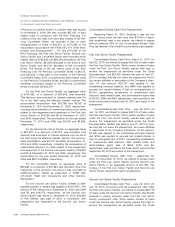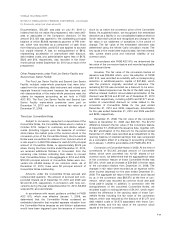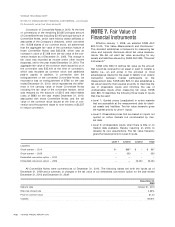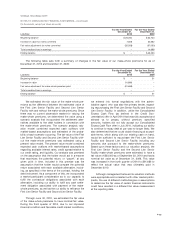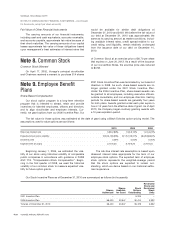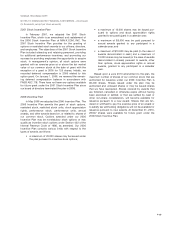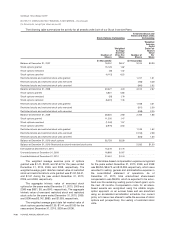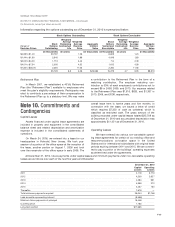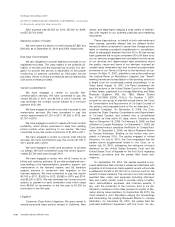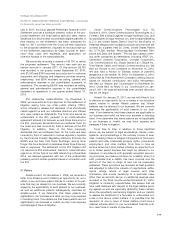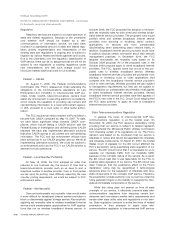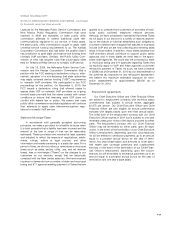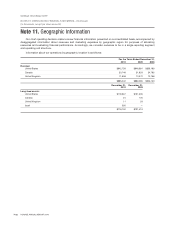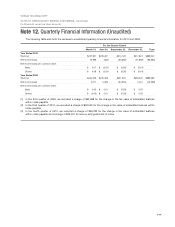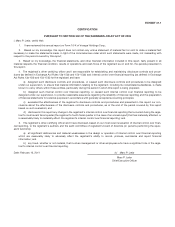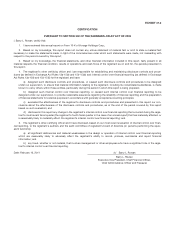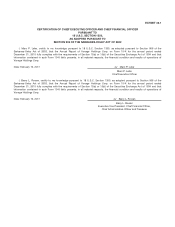Vonage 2010 Annual Report Download - page 85
Download and view the complete annual report
Please find page 85 of the 2010 Vonage annual report below. You can navigate through the pages in the report by either clicking on the pages listed below, or by using the keyword search tool below to find specific information within the annual report.V
O
NA
G
EH
O
LDIN
GS CO
RP
.
N
OTES TO CONSOLIDATED FINANCIAL STATEMENTS—(Continued)
(
In thousands, except per share amounts
)
R
egu
l
at
i
o
n
T
elephon
y
services are subject to a broad spectrum o
f
s
tate and federal regulations. Because of the uncertaint
y
o
v
e
rwh
e
th
e
rV
o
IP
s
h
ou
l
dbe
tr
ea
t
ed as a
t
e
l
e
-
communications or information service, we have bee
n
i
nvolved in a substantial amount of state and federal re
g
u-
l
atory activity. Implementation and interpretation of th
e
existin
g
laws and re
g
ulations is on
g
oin
g
and is subject to
l
iti
g
ation by various
f
ederal and state a
g
encies and courts
.
Due to the uncertainty over the re
g
ulatory classi
f
ication o
f
VoIP service, there can be no assurance that we will not b
e
s
ubject to new re
g
ulations or existin
g
re
g
ulations unde
r
new interpretations, and that such chan
g
e would not
i
ntr
oduce
m
a
t
e
ri
a
l
add
iti
o
n
a
l
cos
t
s
t
oou
r
bus
in
ess.
Federal —
C
ALEA
O
nAu
g
ust 5, 2005, the Federal Communications
C
ommission (the “FCC”) released an Order extendin
g
the
obli
g
ations of the Communications Assistance for Law
Enforcement Act
(
“CALEA”
)
to interconnected VoIP
p
ro
-
v
iders. Under CALEA, telecommunications carriers must
assist law en
f
orcement in executin
g
electronic surveillance
,
which include the capability o
f
providin
g
call content an
d
call-identi
f
yin
g
in
f
ormation to a local en
f
orcement a
g
ency,
or LEA,
p
ursuant to a court order or other law
f
ul author
-
i
z
a
t
io
n
.
T
he F
CC
required all interconnected VoIP providers to
b
ecome full
yC
ALEA compliant b
y
Ma
y
14, 2007. To date
,
we have taken significant steps towards
C
ALEA com
-
p
liance, which include testing a
C
ALEA solution with th
e
Federal Bureau of Investigation and delivering lawful
C
ALE
A
r
equests.
W
e
h
ave a
l
so
i
mp
l
emente
d
a
l
ternat
i
ve so
l
ut
i
ons
t
hat allow
C
ALEA access to call content and call-identifying
i
nformation. The F
CC
and law enforcement officials hav
e
b
een advised as to our
C
ALEA pro
g
ress and our efforts at
i
mplementin
g
alternative solutions. We could be subject to
an enforcement action by the F
CC
if our
C
ALEA solution is
deemed not fully operational
.
F
e
d
era
l
–
L
oca
lN
um
b
er
P
orta
bili
t
y
O
nMa
y
13, 2009, the F
CC
adopted an order tha
t
r
educed to one business day the amount of time that a
t
elecommunications
p
rovider such as us have to
p
ort a
t
ele
p
hone number to another
p
rovider. If we, or third
p
arties
we rely upon for portin
g
, have difficulty executin
g
the ne
w
one-day portin
g
requirement, we could be subject to F
CC
e
n
fo
r
ce
m
e
nt
ac
ti
o
n.
F
e
d
era
l
–
N
et
N
eutra
li
t
y
C
lear and enforceable net neutrality rules would mak
e
i
t more di
ff
icult
f
or broadband Internet service
p
roviders t
o
b
lock or discriminate a
g
ainst Vona
g
e service. Also explicitly
applyin
g
net neutrality rules to wireless broadband Interne
t
s
ervice could create
g
reater opportunities
f
or VoIP applica
-
t
i
o
n
s
th
a
tr
u
n
o
n wir
e
l
ess b
r
oadba
n
d
Int
e
rn
e
t
se
rvi
ce
.I
n
O
ctober 2009, the F
CC p
ro
p
osed the ado
p
tion of enforce
-
able net neutrality rules for both wired and wireless broad-
b
and Internet service
p
roviders. The
p
ro
p
osed rules woul
d
p
rohibit wired and wireless broadband Internet servic
e
p
roviders
f
rom blockin
g
or hinderin
g
law
f
ul content
,
applications, or services and
f
rom unreasonabl
y
discriminatin
g
when transmittin
g
law
f
ul network tra
ff
ic. I
n
addition, broadband Internet service
p
roviders would hav
e
t
o publicly disclose certain in
f
ormation about their networ
k
mana
g
ement practices. In December 2010, the FC
C
adopted en
f
orceable net neutrality rules based on it
s
O
ctober 2009
p
ro
p
osal. All of the
p
ro
p
osed rules in th
e
O
ctober 2009 proposal apply to wired broadband Internet
p
roviders. The FCC, a
pp
lied some but not all of the
p
ro
-
p
osed rules to wireless broadband service. Wireless
b
roadband Internet services
p
roviders are
p
rohibited
f
ro
m
b
lockin
g
or hinderin
g
voice or video applications tha
t
com
p
ete with the broadband Internet service
p
rovider’s
v
oice or video services. Wireless
p
roviders are also sub
j
ect
t
o transparency requ
i
rements,
b
ut t
h
ey are not su
bj
ect t
o
th
e
p
ro
hibi
t
i
on on unreasona
bl
e
di
scr
i
m
i
nat
i
on t
h
at a
ppli
e
s
t
o wired broadband Internet services providers. Several
b
roadband Internet service providers have
f
iled appeals o
f
t
he FCC’s new rules in the D.C. Circuit Court alleging tha
t
t
he FCC lacks authorit
y
to appl
y
its rules to broadband
I
nternet serv
i
ce prov
id
ers
.
S
tate Telecommunications Re
g
ulation
In general, the focus of interconnected VoIP tele
-
communications re
g
ulation is at the federal level.
On
November 12, 2004, the F
CC
issued a declaratory rulin
g
p
rovidin
g
that our service is subject to federal re
g
ulation
and
p
reem
p
ted the Minnesota Public Utilities
C
ommissio
n
from imposin
g
certain of its re
g
ulations on us. The F
CC
’s
dec
i
s
i
o
nw
as based o
nit
sco
n
c
l
us
i
o
nth
a
t
ou
r
se
rvi
ce
i
s
i
nterstate in nature and cannot be se
p
arated into interstat
e
and intrastate com
p
onents.
O
n March 21, 2007, the Unite
d
S
tates Court of A
pp
eals for the 8th Circuit affirmed th
e
FCC’s declaratory rulin
g
preemptin
g
state re
g
ulation of our
s
ervice. The 8th Circuit found that it is im
p
ossible for us t
o
s
e
p
arate our interstate tra
ff
ic
f
rom our intrastate tra
ff
i
c
b
ecause o
f
the nomadic nature o
f
the service. As a result
,
t
he 8th
C
ircuit held that it was reasonable for the F
CC
to
p
reempt state re
g
ulation of our service. The 8th Circuit wa
s
clear, however, that the
p
reem
p
tive effect of the FCC’s
declaratory rulin
g
may be reexamined i
f
technolo
g
ica
l
advances allow
f
or the se
p
aration o
f
interstate and intra
-
s
tate com
p
onents o
f
the nomadic VoIP service. There
f
ore,
t
he preemption o
f
state authority over our service under thi
s
r
ulin
gg
enerally hin
g
es on the inability to separate the inter-
s
tate and intrastate com
p
onents o
f
the service
.
While this rulin
g
does not exempt us
f
rom all stat
e
oversi
g
ht o
f
our service, it e
ff
ectively prevents state tele
-
communications re
g
ulators
f
rom imposin
g
certain bur
-
densome and inconsistent market entry requirements and
certain other state utility rules and re
g
ulations on our serv-
i
ce. State re
g
ulators continue to probe the limits of federa
l
p
reemption in their attempts to apply state tele-
communications re
g
ulation to interconnected VoIP service
.
F-30
VO
NA
G
E ANN
U
AL REP
O
RT 2010


